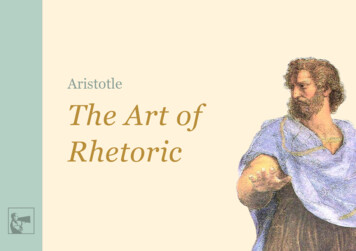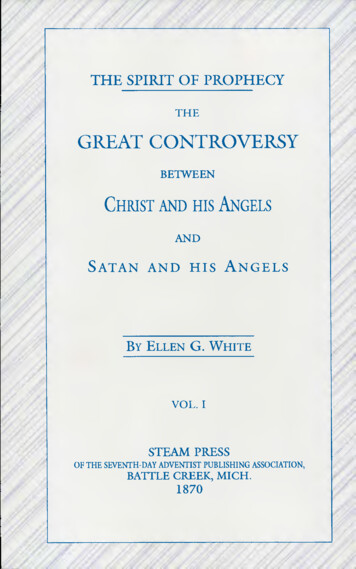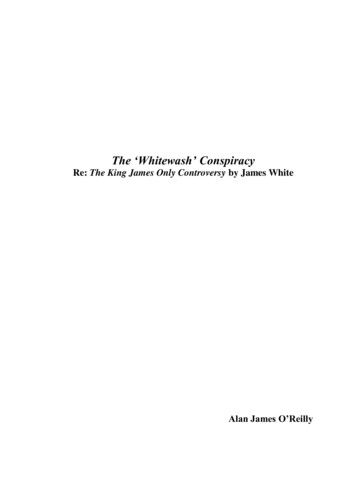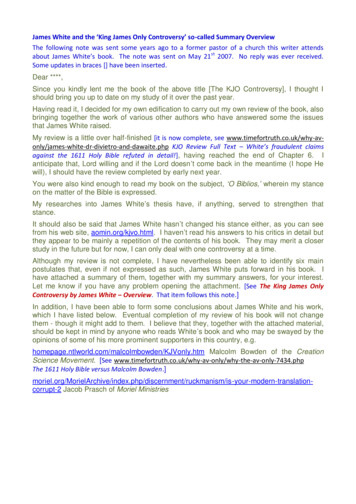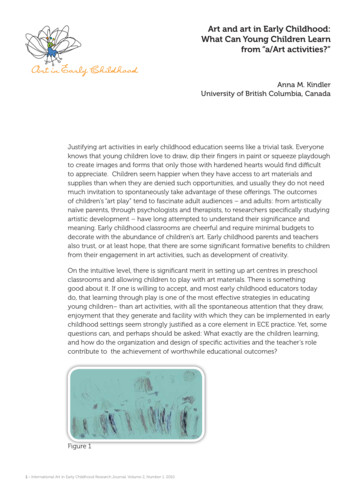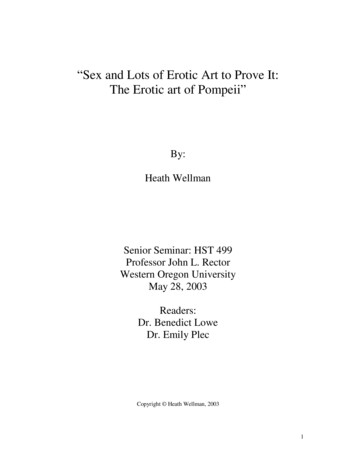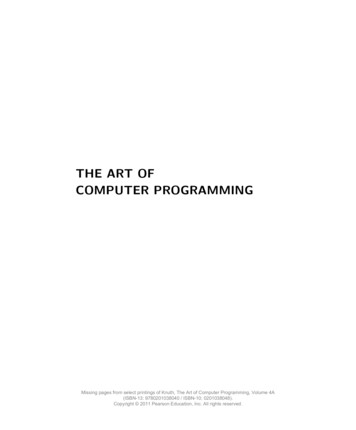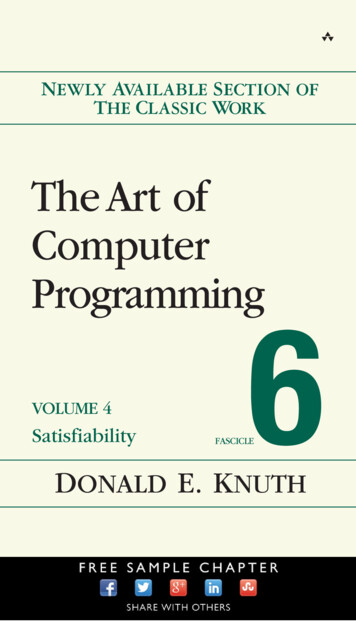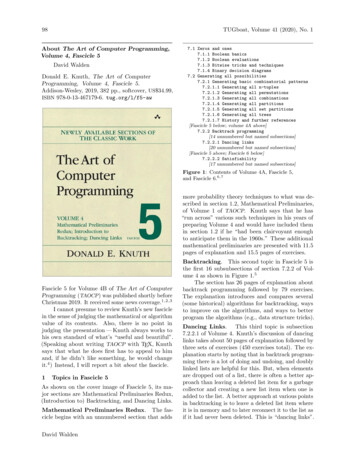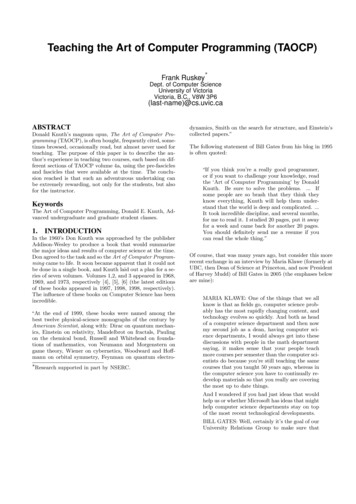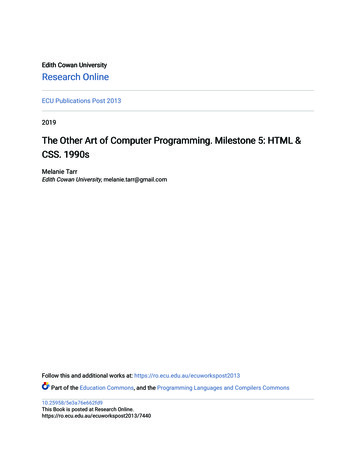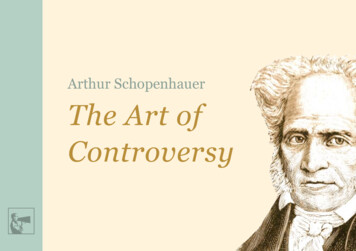
Transcription
Arthur SchopenhauerThe Art ofControversyArthur Schopenhauer The Art of Controversy1
Arthur SchopenhauerThe Art of ControversyTranslated by Thomas Bailey SaundersEdited by Axel WendelbergerMegaphone eBooks 2008Arthur Schopenhauer The Art of Controversy2
PrefaceThe essay on The Art of Controversy was neverpublished as a whole in Schopenhauer’s lifetime(1788 – 1860). It was discovered in his papersand made public soon after his death.After publishing the German version of theessay as a Megaphone eBook, recent politicalevents in the U.S. inspired me to release anEnglish version, too.As the translator, Thomas Bailey Saunders(1860 – 1928), pointed out in 1896, “Theintelligent reader will discover that a good deal ofits contents is of an ironical character.” Althoughit is a highly scientific study on dialectic andrhetoric, the irony of the text reveals the truegenius of Arthur Schopenhauer. Reading theessay can be challenging at times. Hence, I find itastonishing how fresh and up-to-date this text is,Arthur Schopenhauer The Art of Controversyand what it can tell us about modern-daypoliticians.While editing the text I have made someadjustments according to the German version. Ihave put the fragment of the introduction in theappendix. I have extended Stratagem 36 by anextract from Oliver Goldsmith’s The Vicar ofWakefield. I have adjusted the text structure tothe German version (just in case one or twoafficionados set out to compare the two editions).Missing parts are indicated by three stars(***). Though, some incongruences still remain.Nevertheless, I hope you enjoy the text as muchas I did.Axel Wendelberger, 20083
Controversial DialecticControversial Dialectic is the art of disputing, andof disputing in such a way as to hold one’s own,whether one is in the right or the wrong — per faset nefas.1 A man may be objectively in the right,and nevertheless in the eyes of bystanders, andsometimes in his own, he may come off worst. Forexample, I may advance a proof of some assertion,and my adversary may refute the proof, and thusappear to have refuted the assertion, for whichthere may, nevertheless, be other proofs. In thiscase, of course, my adversary and I change places:he comes off best, although, as a matter of fact, heis in the wrong.If the reader asks how this is, I reply that it issimply the natural baseness of human nature. Ifhuman nature were not base, but thoroughlyhonourable, we should in every debate have noother aim than the discovery of truth; we shouldArthur Schopenhauer The Art of Controversynot in the least care whether the truth proved tobe in favour of the opinion which we had begunby expressing, or of the opinion of our adversary.That we should regard as a matter of no moment,or, at any rate, of very secondary consequence;but, as things are, it is the main concern. Ourinnate vanity, which is particularly sensitive inreference to our intellectual powers, will notsuffer us to allow that our first position waswrong and our adversary’s right. The way out ofthis difficulty would be simply to take the troublealways to form a correct judgment. For this a manwould have to think before he spoke. But, withmost men, innate vanity is accompanied byloquacity and innate dishonesty. They speakbefore they think; and even though they mayafterwards perceive that they are wrong, and thatwhat they assert is false, they want it to seem the4
contrary. The interest in truth, which may bepresumed to have been their only motive whenthey stated the proposition alleged to be true, nowgives way to the interests of vanity: and so, for thesake of vanity, what is true must seem false, andwhat is false must seem true.However, this very dishonesty, this persistencein a proposition which seems false even to ourselves, has something to be said for it. It oftenhappens that we begin with the firm conviction ofthe truth of our statement; but our opponent’sargument appears to refute it. Should we abandonour position at once, we may discover later onthat we were right after all; the proof we offeredwas false, but nevertheless there was a proof forour statement which was true. The argumentwhich would have been our salvation did notoccur to us at the moment. Hence we make it arule to attack a counter-argument, even though toall appearances it is true and forcible, in the beliefthat its truth is only superficial, and that in theArthur Schopenhauer The Art of Controversycourse of the dispute another argument will occurto us by which we may upset it, or succeed inconfirming the truth of our statement. In this waywe are almost compelled to become dishonest; or,at any rate, the temptation to do so is very great.Thus it is that the weakness of our intellect andthe perversity of our will lend each other mutualsupport; and that, generally, a disputant fightsnot for truth, but for his proposition, as though itwere a battle pro aris et focis. He sets to work perfas et nefas; nay, as we have seen, he cannoteasily do otherwise.As a rule, then, every man will insist onmaintaining whatever he has said, even thoughfor the moment he may consider it false ordoubtful.2 To some extent every man is armedagainst such a procedure by his own cunning andvillainy. He learns by daily experience, and thuscomes to have his own natural Dialectic, just as hehas his own natural Logic. But his Dialectic is byno means as safe a guide as his Logic. It is not so5
easy for any one to think or draw an inferencecontrary to the laws of Logic; false judgments arefrequent, false conclusions very rare. A mancannot easily be deficient in natural Logic, but hemay very easily be deficient in natural Dialectic,which is a gift apportioned in unequal measure.In so far natural Dialectic resembles the faculty ofjudgment, which differs in degree with everyman; while reason, strictly speaking, is the same.For it often happens that in a matter in which aman is really in the right, he is confounded orrefuted by merely superficial arguments; and if heemerges victorious from a contest, he owes it veryoften not so much to the correctness of hisjudgment in stating his proposition, as to thecunning and address with which he defended it.Here, as in all other cases, the best gifts are bornwith a man; nevertheless, much may be done tomake him a master of this art by practice, andalso by a consideration of the tactics which maybe used to defeat an opponent, or which he usesArthur Schopenhauer The Art of Controversyhimself for a similar purpose. Therefore, eventhough Logic may be of no very real, practical use,Dialectic may certainly be so; and Aristotle, too,seems to me to have drawn up his Logic proper,or Analytic, as a foundation and preparation forhis Dialectic, and to have made this his chiefbusiness. Logic is concerned with the mere formof propositions; Dialectic, with their contents ormatter — in a word, with their substance. It wasproper, therefore, to consider the general form ofall propositions before proceeding to particulars.Aristotle does not define the object of Dialecticas exactly as I have done it here; for while heallows that its principal object is disputation, hedeclares at the same time that it is also thediscovery of truth.3 Again, he says, later on, thatif, from the philosophical point of view, propositions are dealt with according to their truth,Dialectic regards them according to their plausibility, or the measure in which they will win theapproval and assent of others.4 He is aware that6
the objective truth of a proposition must bedistinguished and separated from the way inwhich it is pressed home, and approbation wonfor it; but he fails to draw a sufficiently sharpdistinction between these two aspects of thematter, so as to reserve Dialectic for the latteralone.5 The rules which he often gives for Dialecticcontain some of those which properly belong toLogic; and hence it appears to me that he has notprovided a clear solution of the problem.6***To form a clear idea of the province of Dialectic,we must pay no attention to objective truth (whichis an affair of Logic); we must regard it simply asthe art of getting the best of it in a dispute, which,as we have seen, is all the easier if we are actuallyin the right. In itself Dialectic has nothing to dobut to show how a man may defend himselfagainst attacks of every kind, and especiallyagainst dishonest attacks; and, in the samefashion, how he may attack another man’s stateArthur Schopenhauer The Art of Controversyment without contradicting himself, or generallywithout being defeated. The discovery of objectivetruth must be separated from the art of winningacceptance for propositions; for objective truth isan entirely different matter: it is the business ofsound judgment, reflection and experience, forwhich there is no special art. Such, then, is theaim of Dialectic. It has been defined as the Logicof appearance; but the definition is a wrong one,as in that case it could only be used to repel falsepropositions. But even when a man has the righton his side, he needs Dialectic in order to defendand maintain it; he must know what the dishonesttricks are, in order to meet them; nay, he mustoften make use of them himself, so as to beat theenemy with his own weapons. Accordingly, in adialectical contest we must put objective truthaside, or, rather, we must regard it as anaccidental circumstance, and look only to thedefence of our own position and the refutation ofour opponent’s. In following out the rules to this7
end, no respect should be paid to objective truth,because we usually do not know where the truthlies. As I have said, a man often does not himselfknow whether he is in the right or not; he oftenbelieves it, and is mistaken: both sides oftenbelieve it. Truth is in the depths. At the beginningof a contest each man believes, as a rule, thatright is on his side; in the course of it, bothbecome doubtful, and the truth is not determinedor confirmed until the close. Dialectic, then, needhave nothing to do with truth, as little as thefencing master considers who is in the right whena dispute leads to a duel. Thrust and parry is thewhole business. Dialectic is the art of intellectualfencing; and it is only when we so regard it thatwe can erect it into a branch of knowledge. For ifwe take purely objective truth as our aim, we arereduced to mere Logic; if we take the maintenanceof false propositions, it is mere Sophistic; and ineither case it would have to be assumed that wewere aware of what was true and what was false;Arthur Schopenhauer The Art of Controversyand it is seldom that we have any clear idea of thetruth beforehand. The true conception of Dialecticis, then, that which we have formed: it is the art ofintellectual fencing used for the purpose of gettingthe best of it in a dispute; and, although the nameEristic would be more suitable, it is more correctto call it controversial Dialectic, Dialecticaeristica.Dialectic in this sense of the word has no otheraim but to reduce to a regular system and collectand exhibit the arts which most men employwhen they observe, in a dispute, that truth is noton their side, and still attempt to gain the day.Hence, it would be very inexpedient to pay anyregard to objective truth or its advancement in ascience of Dialectic; since this is not done in thatoriginal and natural Dialectic innate in men,where they strive for nothing but victory. Thescience of Dialectic, in one sense of the word, ismainly concerned to tabulate and analysedishonest stratagems, in order that in a real8
debate they may be at once recognised anddefeated. It is for this very reason that Dialecticmust admittedly take victory, and not objectivetruth, for its aim and purpose.I am not aware that anything has been done inthis direction, although I have made inquiries farand wide.7 It is, therefore, an uncultivated soil. Toaccomplish our purpose, we must draw from ourexperience; we must observe how in the debateswhich often arise in our intercourse with ourfellow-men this or that stratagem is employed byone side or the other. By finding out the commonelements in tricks repeated in different forms, weshall be enabled to exhibit certain generalstratagems which may be advantageous, as wellfor our own use, as for frustrating others if theyuse them.What follows is to be regarded as a firstattempt.Arthur Schopenhauer The Art of Controversy9
The Basis of all DialecticFirst of all, we must consider the essential natureof every dispute: what it is that really takes placein it. Our opponent has stated a thesis, or weourselves, — it is all one. There are two modes ofrefuting it, and two courses that we may pursue.The modes are (1) ad rem, (2) ad hominem orex concessis. That is to say: We may show eitherthat the proposition is not in accordance with thenature of things, i.e., with absolute, objective truth;or that it is inconsistent with other statements oradmissions of our opponent, i.e., with truth as itappears to him. The latter mode of arguing aquestion produces only a relative conviction, andmakes no difference whatever to the objectivetruth of the matter.The two courses that we may pursue are (1) thedirect, and (2) the indirect refutation. The directattacks the reason for the thesis; the indirect, itsArthur Schopenhauer The Art of Controversyresults. The direct refutation shows that the thesisis not true; the indirect, that it cannot be true.The direct course admits of a twofold procedure. Either we may show that the reasons for thestatement are false (nego majorem, minorem); orwe may admit the reasons or premisses, but showthat the statement does not follow from them(nego consequentiam); that is, we attack theconclusion or form of the syllogism. The directrefutation makes use either of the diversion or ofthe instance.(a) Apagoge, the diversion. — We accept ouropponent’s proposition as true, and then showwhat follows from it when we bring it intoconnection with some other propositionacknowledged to be true. We use the twopro
Arthur Schopenhauer The Art of Controversy 4 Controversial Dialectic is the art of disputing, and of disputing in such a way as to hold one’s own, whether one is in the right or the wrong — per fas et nefas.1 A man may be objectively in the right, and nevertheless in the eyes of bystanders, and sometimes in his own, he may come off worst. For
